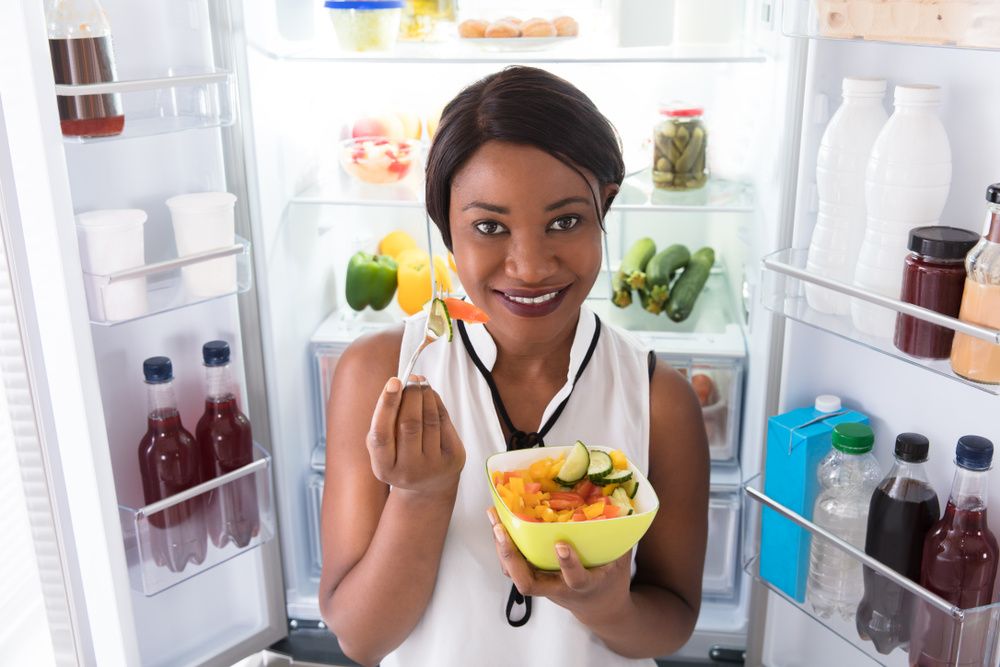Wellness

Ad
My relationship with meat is complicated and I haven't quite been able to go full vegan just yet. But considering the obvious health benefits, I want to eventually get there. My first step is to start as a vegetarian. And while, for me, it's not as drastic as going all the way vegan, it's definitely more than a simple notion and takes so much preparation. I've been able to hang in there for a little more than a month.
Nevertheless, I found a few tips along the way that would have been great to know beforehand. From getting familiar with healthy meat alternatives to steering clear of unhealthy choices, there are a couple of things to do and consider before you take the plunge.
Stock Up On Protein

I definitely should have looked at healthy protein alternatives before I kicked off this meatless lifestyle. I mean, I didn't go in completely blind, and at the very least did a little research, but this was clearly a factor that I overlooked. We all know that other than its juicy texture and mouth-watering flavor, one of the main benefits of meat is protein. So when you axe it from your diet, you run the risk of your body lacking some of the most important nutrients such as protein.
Related: 9 Tips on How to Transition to a Vegan Diet
Fortunately for you and all of our fellow proud vegetarians and aspiring vegans, meat isn't the only food that has a hefty supply of protein in it. (Thank you Captain Obvious) Some of the more popular protein options are quinoa, peanut butter, almonds, Greek yogurt, spinach, and eggs. Other options that I've had to be a little more creative with are lentils, peas, and beans. Ezekiel bread, hummus, sun-dried tomatoes, and pumpkin seeds are other options that most people didn't know contained tons of protein.
There are plenty of meatless options that give you just what you need to live this hard-knock vegetarian lifestyle. So you're in good hands.
Carbs Are Still Not A Go-To, Boo
Before you embark on being a vegetarian, think about cutting out unhealthy carbs and even desserts. This can help you have a long-lasting healthy regime that's more permanent than a trendy diet. I hope I'm not alone when I say I seriously thought that just because I wasn't eating meat, I could add a bunch of other unhealthy stuff to my diet, or at least keep filling up on the junk I was already eating. Please don't judge my life. Because it didn't take long for me to realize this was not the way to go.
Without meat, it's obvious that I wasn't feeling nearly as full after a meal, so I subconsciously filled up on snacks and potatoes. And I never really even ate chips like that before (shout out to white cheddar Cheez-Its for getting me through). My body didn't really feel a difference, but it didn't feel much better either. I had to learn quickly that instead of filling up on snacks, I needed to eat more vegetables, fruits, and healthy proteins. After all, that was the real reason for going vegetarian to begin with—so I could live a healthier lifestyle and not just put it in my Instagram bio.
Weight Loss Isn't Automatic
One of the positive factors of going vegetarian is (supposedly) weight loss. However, there's a catch or two for this major key.
For starters, it takes your body a while to even adjust and realize that you aren't eating meat. For me, it was a few weeks. If I had known the pounds wouldn't start shedding after day one, two, three, or even seven, I would have at least been a little more patient with myself and not expected to see immediate results. It probably didn't help that I was embracing those infamous carbs on another level too. Another factor is exercise.
Yes, going without meat is a healthy choice, especially for those who have made the change after seeing documentaries like What The Health and Food, Inc. But as difficult as it is, it's not the only change that's needed in order for you to have a healthy lifestyle overall. I actually stopped doing my daily workout when I cut meat from my diet because I really didn't think I needed it anymore.
At the same time, I was afraid I would start gaining too much muscle. After the first few weeks of not seeing a change, I started back on my workout. And to be honest, it felt really good and was the change I was looking for.
Remember Everybody Is Different & Every Body Is Different
Remy Ma's health journey is major #GOALS for me, but let's be real, I might not ever get those results. Just because someone is a size 6 and happens to be a vegetarian, doesn't mean that's going to be all of our stories. It could become that eventually, but if not, we have to be happy with what we are and remember that the ultimate #GOAL is to be healthy.
Looking at someone else's results is a huge no-no when you start out on this journey.
To begin with, it's super likely and pretty much inevitable that your body is going to respond to your new vegetarian lifestyle completely differently than how your friend's body responds to hers. And if looking at someone else's results makes you feel down about yourself or that there's no way you're doing it right, please stop. The main key is to do what's best for you and your body and make necessary changes however you see fit.
If you need to add fish or chicken every so often, go for it, but do it with a plan. Our bodies aren't cookie-cutter, and neither is this process. But knowing what's best for you and sticking with your own journey will get you the results you need.
Featured image by Shutterstock
Related Articles Around the Web
- Thinking of Going Vegetarian? 6 Ways to Get There | Reader's Digest ›
- Vegetarian Society - Go Veggie ›
- Becoming a vegetarian - Harvard Health ›
- How to Become a Vegetarian, the Easy Way : zen habits ›
- What to Know Before You Go Vegetarian | Everyday Health ›
- 10 things you should know before going veggie | BBC Good Food ›
- The Most Laid-Back Guide to Going Vegetarian You'll Ever Read ›
- Everything You Need to Know About Going Vegetarian — Explained ›
- 22 Things To Know Before You Decide To Stop Eating Meat ›
- The Beginner's Guide To Going Vegetarian Without Getting Sick ... ›
ALSO ON XONECOLE


